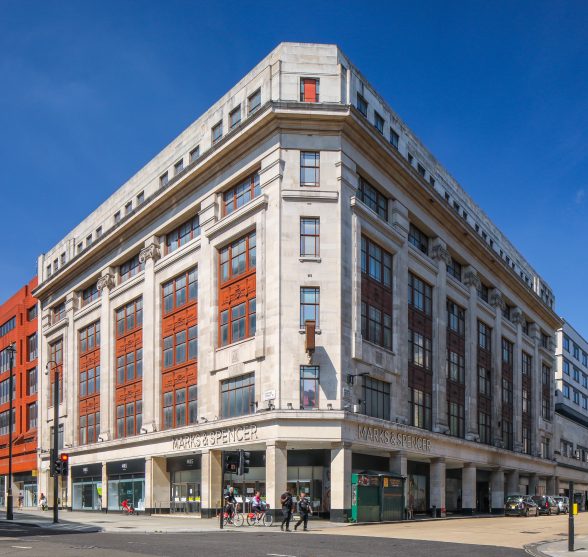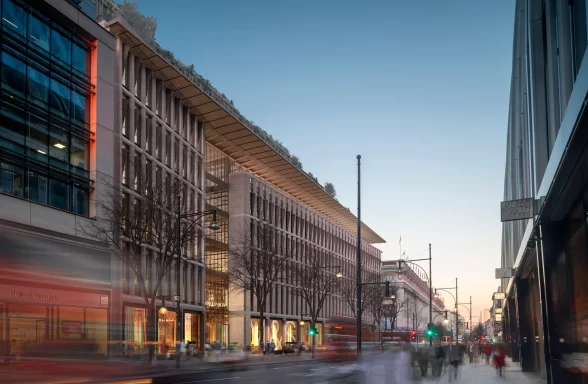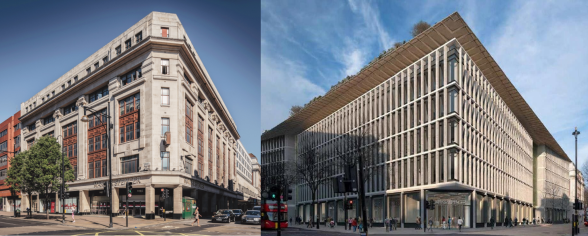This website uses cookies
This website uses cookies to enable it to function properly and to analyse how the website is used. Please click 'Close' to accept and continue using the website.



Image: John East
C20 Society is delighted by the news that plans to demolish the M&S flagship store on Oxford Street have been rejected by the Secretary of State. This result has been widely forecast as one likely to have very significant impact on future planning decisions and policy, regarding both heritage and environmental issues – the two being intrinsically interlinked. The verdict means that M&S’s proposals to demolish and rebuild their shop at the West End of Oxford Street cannot now go ahead. The Society hopes that M&S will accept this result and look to refurbish the building themselves, or sell it someone else who will do this.
The Planning Inquiry was ably fought by SAVE Britain’s Heritage, and we salute their tenacity and resolve in pursuing this landmark case. It takes a huge amount of expertise and energy to stand up to large scale development proposals, and the enormous resources which commercial teams can muster to back them. SAVE have done a great job in ensuring a vigorous public airing of important principles, and have secured a victory backed by massive volunteer support.

Image: Pilbrow and Partners
The movement to save M&S was initiated by a listing proposal from C20 Society in 2021. Although this application was unsuccessful, our championing it as an important heritage building is vindicated by Secretary of State Michael Gove’s judgment that “this does not mean that it is without significance or merit, both on its own terms as a Non Designated Heritage Asset and in terms of its contribution to the streetscape and the setting of Selfridges”. Furthermore, he said that he “attached substantial weight to its loss” and that he gave “very great weight” to the heritage arguments in the case. This judgement will therefore help local authorities and campaigners around the country secure the future of many more unlisted buildings which are often much loved and highly valued. It also highlights the need to safeguard the wider settings of listed buildings.
C20 has also long drawn attention to the environmental advantages of refurbishment over demolition, and has welcomed the increased acceptance of the role that retrofitting buildings can have in achieving net zero. We wrote to M&S in December 2021, urging a rethink, and pointing out that demolition was “simply incompatible” with their own commitments towards achieving net zero as a responsible company. The judgement also encourages retrofit by strengthening current guidance and clearly putting the onus on developers to demonstrate that there has “been an appropriately thorough exploration of alternatives to demolition” and to show that “options for retaining … buildings have been fully explored” before consent for demolition can be granted.

Images: John East / Pilbrow & Partners
History of the site
Designed and built 1929-30, Orchard House is the work of architects Alfred Frederick Aldridge Trehearne (1874-1962) and Charles Frederick Norman (1884-1925), in the ‘Neo-Grec’ style – a variant on classicism and forerunner to Art Deco. It sits at the junction of Oxford Street and Orchard Street, providing a playful and deferential neighbour to the more grandiose elevations of the Grade II* listed Selfridges, immediately adjacent. At one point, the six storey Portland stone and marble facade even carried sculpted heads of characters from Lewis Carroll’s novels, though these only partially survive.
After our attempts to have the building listed proved unsuccessful, Westminster Council granted planning approval in November 2021 for the proposals by Pilbrow & Partners to demolish the 1930’s Orchard House, a 1970’s extension to the rear, plus the adjoining 1980s Neale House on Oxford Street.
A petition against the decision was launched by SAVE and C20 in December 2021, with pressure intensifying throughout early 2022 for the Secretary of State to call-in the application. In June 2022 a public inquiry was announced, which took place over two weeks in November 2022. The Secretary of State’s decision was published on 20 July 2023, capping a two year period where the case attracted regular national media attention and put the subject of retrofit and arguments around embodied carbon at the centre of public debate.

Become a C20 member today and help save our modern design heritage.